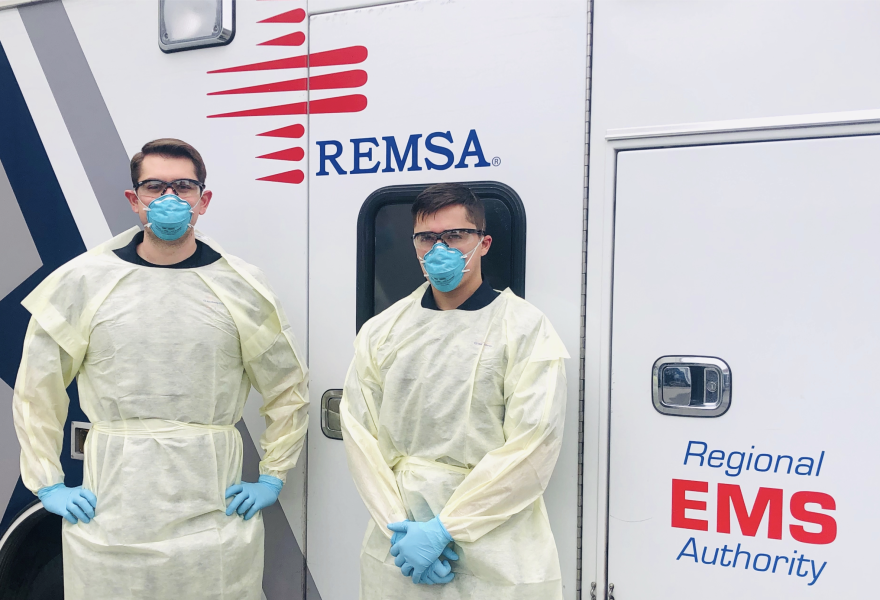Coverage of novel coronavirus is supported by the Mick Hitchcock, Ph.D., Project for Visualizing Science, a science reporting project from the Reynolds School of Journalism.
There are surges of COVID-19 patients at hospitals in some hotspots around the country, but overall, emergency room visits are actually down nationwide. However, some local medical providers are concerned that people are avoiding care due to fears of catching COVID-19.
Ryan Ramsdell has been a paramedic for 15 years at the Regional Emergency Medical Services Authority, or REMSA, Northern Nevada’s ambulatory service provider. He’s accustomed to handling a range of medical emergencies on a regular basis. But lately, as Ramsdell arrives on the scene for a call, he’s finding people are experiencing advanced conditions, more so than what he saw prior to COVID-19.
“The calls that we have been responding to, our patients are more critical now,” Ramsdell said, “and a lot of that — in talking to families and the patients' caregivers — is that a lot of them are afraid to go to the hospital when their symptoms would warrant them to go to the hospital.”
One thing Ramsdell is also experiencing is that once he and his team respond to a call and stabilize the patients at home, some of them will go AMA, which means they go against medical advice.
“A lot of patients will call for assistance, but they don't want us to transport them. A lot of people are just afraid to go to the hospital,” Ramsdell explained. “They're afraid to go to the hospital, that they're going to catch the COVID virus, or they just don't want to expose themselves to that.”
Ramsdell said those fears are preventing people from getting the medical care they need. What he wants people to understand is that paramedics have been trained to deal with mitigating infections prior to COVID-19, and are taking even more precautions now.
“We're wearing PPE. We're wearing masks, we're wearing our gloves, our goggles [and] our gowns. We're protecting ourselves to help protect the community and the hospitals are doing the same thing as well," Ramsdell said. “We don't want to cross-contaminate or inadvertently give anybody the COVID virus or any other ailment someone might have.”
On top of that, Ramsdell said disinfecting the ambulance and equipment after each transport has always been routine, but paramedics are doing even more extensive cleaning right now.
Adam Heinz is the executive director of integrated health for REMSA. He said the agency has recently experienced an 8% drop in calls that result in patients being transported, which adds up to about 500 calls a month. He’s worried some people with critical conditions are waiting too long to get help.
“If you experience chest pain, if you have symptoms of a stroke — such as a one-sided weakness, paralysis, difficulty speaking — obviously if you have an altered sensorium or you're disoriented, you're passing out, you're in cardiac arrest, do not hesitate. Contact 911,” Heinz said.
On the other hand, one change Heinz said that has been positive since COVID-19 is that there have been fewer calls for more minor medical issues. People are instead using telehealth options as a first resort.
“Patients would be contacting EMS for low acuity complaints,” Heinz said. “Sometimes that would be a cough, a runny nose, a fever, [or] a sprained ankle.”
But it’s the urgent medical emergencies that Heinz wants people to take seriously by seeking immediate care. And it’s not just paramedics who are seeing people prolong getting help.
Dr. Jenny Wilson is an emergency room doctor. She’s also the medical director for both REMSA and St. Mary’s Regional Medical Center emergency department in Reno.
“I've taken care of patients who have had their abdominal pain for five days. It worries me that people would stay home and let their gallbladder infection get worse and worse, to the point where it compromises their health, or let their chest pain go on without getting it checked out," said Wilson.
As people are staying home more and engaging in fewer activities, she said that can result in a decline in some medical emergencies, but another factor is fear of entering the hospital. Wilson said that providers have taken extra measures to mitigate the spread of COVID-19 in a medical setting.
“The majority of hospitals have a separation of patients with respiratory symptoms and non-respiratory symptoms,” Wilson explained. “But even if you come in with respiratory symptoms and you don't have COVID, you're not going to get COVID by virtue of walking into the emergency department.”
In response to COVID-19, some area hospitals set up alternate care sites early on to screen and treat patients with respiratory symptoms separately from others. Despite the precautions being taken, Wilson is concerned that some people will continue avoiding the ER, and their non-COVID-19 emergencies will become more dire.







